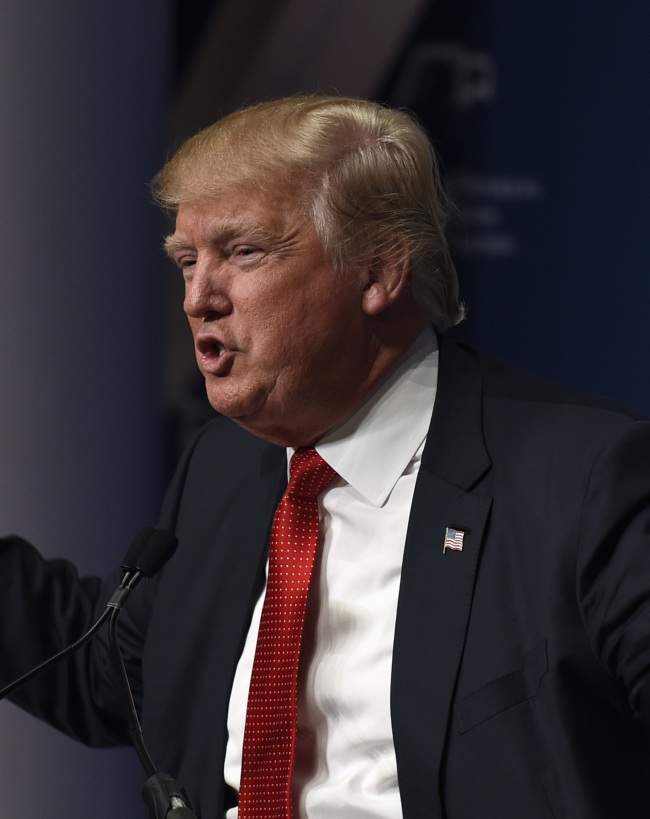[Newsmaker] Muslim provocation, vitriol are Trump strategy: analysts
By Korea HeraldPublished : Dec. 9, 2015 - 20:56
WASHINGTON― Donald Trump’s incendiary new provocation on Muslims plays on American fears about extremists and Syrian refugees, in what analysts said Tuesday was a calculated move by the Republican presidential front-runner ahead of the first primary votes.
The real estate mogul unveiled the most extreme proposal of his rabble-rousing campaign for 2016 on Monday when he called for a “total and complete shutdown” of Muslims entering the United States.
The real estate mogul unveiled the most extreme proposal of his rabble-rousing campaign for 2016 on Monday when he called for a “total and complete shutdown” of Muslims entering the United States.

Trump’s call, made in response to last week’s mass shooting in California by a Muslim couple believed to have been radicalized, drew stern condemnation from both Democrats and Republican rivals, from Muslim leaders around the world and the White House.
But it was greeted with cheers from supporters at Trump’s rally in South Carolina, many of whom are hostile to President Barack Obama’s plans to take in 10,000 Syrian refugees in the coming year, and to immigration in general.
Trump’s Muslim ban proposal was not an off-the-cuff remark; it was laid out in a timely press release from his campaign.
Analysts argued that he was taking calculated steps to rally support before the first nomination votes in Iowa on Feb. 1 and New Hampshire eight days later.
“Strategically, what he’s doing makes sense,” said American University professor of government Jennifer Lawless.
Trump has already galvanized core conservative voters fearful of undocumented workers taking U.S. jobs with his oft-repeated pledge to build a wall along the Mexican border.
Lawless said it was unlikely Trump would be able to win the nomination “entirely on immigration.”
“But if you can link immigration to terrorism and foreign policy and national security, then you have the potential to cast a much wider net.”
The question, she said, is whether Trump has overstepped the bounds.
Widely denounced as “fascist,” Trump’s comments were seen as so far-fetched in singling out the entire Muslim community that they drove the Philadelphia Daily News to compare him to Adolf Hitler.
“The New Furor,” the paper blasted on its front page.
“This is not conservatism,” the Republican House Speaker Paul Ryan told reporters. “What was proposed yesterday is not what this party stands for, and more importantly, it’s not what this country stands for.”
The billionaire doubled down on his us-versus-them proposal in interviews Tuesday.
“We are at war, get it through your head,” he told CNN. “We need ... a certain toughness in this country or we’ll end up like a lot of other places and we’re not going to have a country left.”
Trump has extended his lead in the Republican race amid controversy over his remarks on Muslims, with support from 27 percent of registered voters according to a Quinnipiac University survey last week.
His Muslim ban call could pay short-term political dividends, but in the long run, experts believe his overall voter ceiling remains low.
David Siegel, political science professor at Duke University, said the proposal in itself was unlikely to win over the undecided.
“I can’t imagine many people are never seeing this before, and thinking ‘Oh, well that’s a fantastic idea,’” he said.
But the controversy keeps Trump in the media ― standing out from his rivals ― which is crucial for a celebrity candidate counting on a fear factor among voters.
“People are risk-averse, terrorism seems like a risky and scary thing, and there’s not a clear way of solving the problem,” Siegel said.
“So when someone comes along and offers these simple proposed solutions, even if they won’t actually solve it right, it seems like it’s a way out for them from the unnamed fear.”
There are precedents for barring ethnic groups from entering the United States. Amid heightened anti-Chinese sentiment, Congress passed the Chinese Exclusion Act in 1882, and early 20th century immigration legislation barred Japanese, Indians, and Southeast Asians from entering the country.
Trump’s call for banning people based on religious beliefs would likely run afoul of the U.S. constitution, which bars discrimination on the basis of faith.
But his backers might be turning a blind eye to that, said professor Robert Boatright of Clark University.
“Trump’s supporters care more about his attitude, and the sense that he can get things done, than they care about whether things he’s proposing are legal or practical,” Boatright said.
Christopher Arterton, a professor of political management at George Washington University, said Trump is appealing to voter fears that the United States is evolving towards a so-called “minority-majority” nation, in which minorities make up more than half the population.
“There is sense of real concern, loss of cultural identity,” he said.
Trump appeared unmoved by the criticism. Told on CNN that France, which suffered a horrific attack last month that left 130 dead, has no intention of banning Muslims or halting refugee inflows, he responded: “Maybe they’re going to have to.” (AFP)
-
Articles by Korea Herald







![[KH Explains] Hyundai's full hybrid edge to pay off amid slow transition to pure EVs](http://res.heraldm.com/phpwas/restmb_idxmake.php?idx=644&simg=/content/image/2024/04/18/20240418050645_0.jpg&u=20240419100350)







![[From the Scene] Monks, Buddhists hail return of remains of Buddhas](http://res.heraldm.com/phpwas/restmb_idxmake.php?idx=652&simg=/content/image/2024/04/19/20240419050617_0.jpg&u=20240419175937)

![[KH Explains] Hyundai's full hybrid edge to pay off amid slow transition to pure EVs](http://res.heraldm.com/phpwas/restmb_idxmake.php?idx=652&simg=/content/image/2024/04/18/20240418050645_0.jpg&u=20240419100350)

![[Today’s K-pop] Illit drops debut single remix](http://res.heraldm.com/phpwas/restmb_idxmake.php?idx=642&simg=/content/image/2024/04/19/20240419050612_0.jpg&u=)